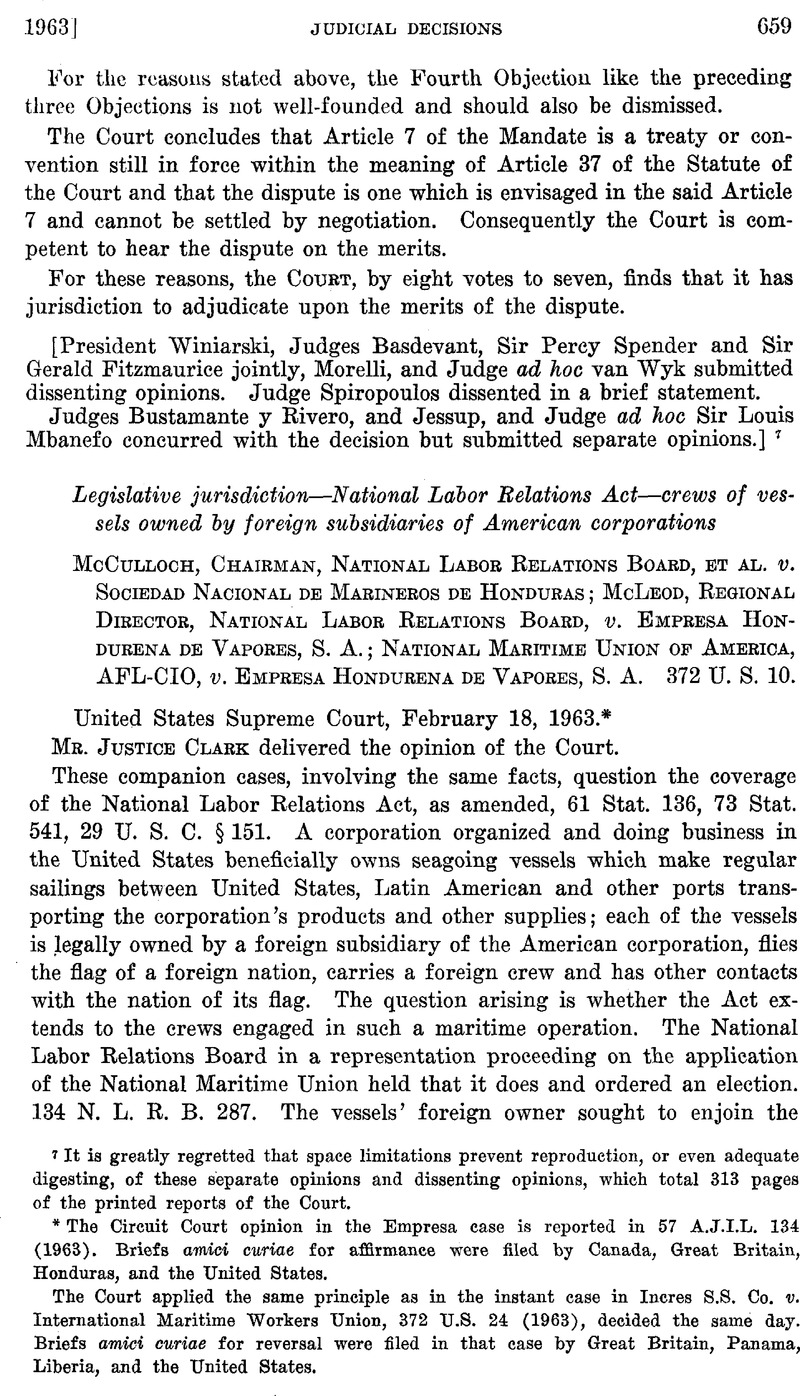No CrossRef data available.
Published online by Cambridge University Press: 28 March 2017

* The Circuit Court opinion in the Empresa case is reported in 57 A.J.I.L. 134 (1963). Briefs amici curiae for affirmance were filed by Canada, Great Britain,Honduras, and the United States.
The Court applied the same principle as in the instant case in lucres S.8. Co. v. International Maritime Workers Union, 372 U.S. 24 (1963), decided the same day. Briefs amici curiae for reversal were filed in that case by Great Britain, Panama, Liberia, and the United States
1 In No. 107, appeal was perfected to the Court of Appeals for the District of Columbia Circuit, to which court we granted a writ of certiorari before judgment. [Footnotes by the Court.]
2 Ten of the 13 vessels are owned and operated by Empresa. Three are owned by Balboa Shipping Co., Inc., a Panamanian subsidiary of United Fruit. Empresa acta as an agent for Balboa in the management of the latter vessels
3 29 TJ. S. C. § 152 (6):
“The term ‘commerce’ means trade, traffic, commerce, transportation, or communication among the several States, or between the District of Columbia or any Territoryof the United States and any State or other Territory, or between any foreign country and any State, Territory, or the District of Columbia, or within the District of Columbia or any Territory, or between points in the same State but through any other State or any Territory or the District of Columbia or any foreign country.”
4 29 U. S. C. § 152 (7) :
“The term ‘affecting commerce’ means in commerce, or burdening or obstructing commerce or the free flow of commerce, or having led or tending to lead to a labor dispute burdening or obstructing commerce or the free flow of commerce.”
5 29 U. S. C. § 159 (c) (1):
“Whenever a petition shall have been filed . . . the Board shall investigate such petition and if it has reasonable cause to believe that a question of representation affecting commerce exists shall provide for an appropriate hearing . . . ”
Section 10 (a) of the Act, 29 U. S. C. § 160 (a), imposes the same requirement, empowering the Board to “prevent any person from engaging in any unfair labor practice . . . affecting commerce.”
6 Sindicato, a Honduran union, had intervened in the proceeding. Sociedad was invited to intervene but declined to do so.
7 See generally Comment, 09 Yale L. J. 498, 506-511 (I960); Boezek, Flags of Convenience (1962).
8 E. g., Dalzell Towing Co., 137 N.L.R.B. No. 48, 50 L.R.E.M. 1164 (1962).
9 Our conclusion does not foreclose such a procedure in different contexts, such as the Jones Act, 46 U. S. C. § 688, where the pervasive regulation of the internal orderof a ship may not be present. As regards application of the Jones Act to maritime torts on foreign ships, however, the Court has stated that “ [p]erhaps the most venerable and universal rule of maritime law relevant to our problem is that which gives cardinal importance to the law of the flag.” Lauritzen v. Larsen, 345 U. S. 571, 584 (1953); see Romero v. International Terminal Operating Co., 358 U. 8. 354, 381-384 (1959); Boczek, op. cit., supra, note 7, at 178-180.
10 In 1959 Congress enacted § 14 (c) (1) of the Act, 29 U. S. C. (Supp. I I ) § 164 (c) (1), granting the Board discretionary power to decline jurisdiction over labor disputes with insubstantial effects, with a proviso that:
“ . . . the Board shall not decline to assert jurisdiction over any labor dispute over which it would assert jurisdiction under the standards prevailing upon August 1, 1959.” I t is argued that the Board would have exerted jurisdiction over Empresa's vessels and crewmen under those “ standards, ” as illustrated by its action in Peninsular & Occidental Steamship Co., 120 N. L. E. B. 1097 (1958), about which case the Congress is presumed to have known. Aside from the fact that Congress presumably was aware also of our decision in Benz, the argument is unconvincing. Nothing in the language or the legislative history of the 1959 amendments to the Act clearly indicates a congressional intent to apply the Act to foreign flagships and their crews. The “standards” to which ' 14 (c) (1) refers are the minimum dollar amounts established by the Board for jurisdictional purposes, and the problem to which § 14 (c) is addressed is the “no-man'sland” created by Guss v. Utah Labor Relations Board, 353 U. S. 1 (1957). See 25 N. L. E. B. Ann. Rep. 18-19 (1960); II Legislative History of the Labor-Management Reporting and Disclosure Act of 1959 (1959), 1153-1154, 1720; 105 Cong. Rec. 6548-6549, 18134
11 State Department regulations provide that a foreign vessel includes “any vessel regardless of ownership, which is documented under the laws of a foreign country.” 22 CFR § 81.1 (f).
12 Article X of the Treaty of Friendship, Commerce and Consular Rights between Honduras and the United States, 45 Stat. 2618 (1927), provides that merchant vessels flying the flags and having the papers of either country “shall, both within the territorial waters of the other High Contracting Party and on the high seas, be deemed to be the vessels of the Party whose flag is flown.”